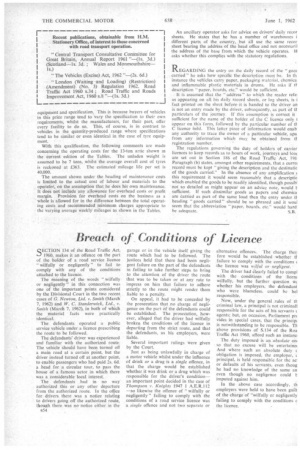Breach of Conditions of Licence
Page 122

If you've noticed an error in this article please click here to report it so we can fix it.
SECTION 134 of the Road Traffic Act, 1960, makes it an offence on the part of the holder of a road service licence " wilfully or negligently" to fail to comply with any of the conditions attached to the licence.
The meaning of the words "wilfully or negligently" in this connection was one of the important points considered by the Divisional Court in the two recent cases of G. Newton, Ltd. v. Smith (March 7, 1962) and .W. C. Standerwick, Ltd., v. Smith (March 7, 1962), in both of which the material facts were practically identical.
The defendants operated a public service vehicle under. a licence prescribing the route tobe followed.
The defendants' driver was experienced and familiar with the authorized route. The vehicle should have been turned off a main road at a certain point, but the driver instead turned off at another point, to enable passengers who had paid 2s. 6d. a .head for a circular tour, to pass the house of a famous actor. in which there was a considerable local interest.
The defendants had in no way authorized this or any other departure from the authorized route. In the office for drivers there was a notice relating to drivers going off the authorized route, though there was no notice either in the 554
garage or in the vehicle itself giving the route which had to be followed. The justices held that there had been negligent failure on the part of the defendants in failing to take further steps to bring to the attention of the driver the route that was to be taken or at any rate to impress on him that failure to adhere strictly to the route. might render them liable to a penalty.
On appeal, it had to be conceded by the prosecution that no charge of negligence on the part Of the defendants could be established. The prosecution, however, alleged that the driver had wilfully broken the conditions of the licence in departing from the strict route, .and that the defendants, as his employers, were liable.
Several important rulings were given by the Court.
Just as being unlawfully in charge of a motor vehicle whilst under the influence of drink or a drug .is a single offence, in that the charge would be established whether it was drink or a drug which was responsible for the driver's condition— an important point decided in the case of Thompson v. Knights 1947 1 A.E.R.112 —so likewise the offence of "wilfully or negligently" failing to comply with the conditions of a road service licence was a single offence and not two separate or alternative offences. The charge then fore would be established whether tt failure to comply with the conditions the licence was wilful or negligent. •
The driver had clearly failed to comp] with the conditions of the :ficenc wilfully, but the -further question Wt whether his employers, the defendant who were blameless, could be hel responsible.
Now, under the general rules of a criminal law, a principal is not criminall responsible for the acts of his servants agents; but, on occasion, Parliament prc vides in special cases, that the principi is notwithstanding to be responsible. Th above provisions of S.134 of the Roa Traffic Act 1960, afford such an instanc The duty imposed is an absolute on so that no excuse will be entertainei And where such an absolute duty c obligation is imposed, the employer, c principal, is held responsible for the ac or defaults of his servants: even. thong he had no knowledge of the same an even though no negligence could t imputed against him.
In the above case accordingly, ,th employers were held to have been guilt of the charge of "wilfully or negligently failing to comply with the conditions c the licence.






































































































































































